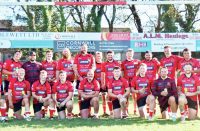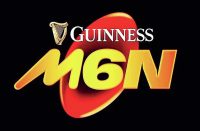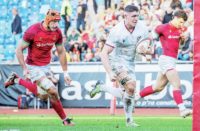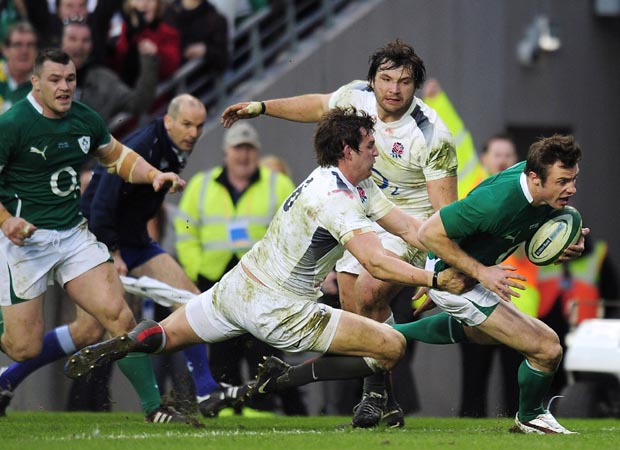 There is no disgrace losing in Dublin – New Zealand are the only team in the world to have avoided that fate and twice even they escaped only with a draw – but four modern day England defeats have been particularly painful for one reason or another. Matches against Ireland can have a dynamic and ambience of their own and the Irish can find motivation and inspiration from all sorts of unexpected directions, especially if they can win the pre-match war of words and mind games and establish themselves as the underdogs. Stuart Lancaster’s England have been warned.
There is no disgrace losing in Dublin – New Zealand are the only team in the world to have avoided that fate and twice even they escaped only with a draw – but four modern day England defeats have been particularly painful for one reason or another. Matches against Ireland can have a dynamic and ambience of their own and the Irish can find motivation and inspiration from all sorts of unexpected directions, especially if they can win the pre-match war of words and mind games and establish themselves as the underdogs. Stuart Lancaster’s England have been warned.
1993: England Lions head for New Zealand with their tails between their legs – Ireland 17 England 3
After back-to-back Grand Slams in 1991 and 1992 and three or four years of powerful, purposeful rugby under captain Will Carling, England were expected to dominate the Lions tour party to New Zealand in 1993 – and ultimately that’s what happened – but having ascended the highest summits England were in sharp decline by 1993 and losing focus and the Irish, not for the first time, picked up on a little complacency and, dare one say, a lack of respect.
England had got lucky against France with a fortunate try for Ian Hunter, lost in Wales and only a magnificent try by Rory Underwood in a scrappy win over Scotland – courtesy of Stuart Barnes and Jerry Guscott – gave England fans anything to smile about.
The Lions squad was being announced fewer than 48 hours after the game at Lansdowne Road and you fancy Ireland might just have got whiff of the fact that 17 Englishmen were in the original squad of 30. And just two Irishmen. Famously the one English forward not picked, Jeff Probyn, should probably have been the first man on the plane.
Anyway, Ireland, with a few points to prove, took on a lethargic England up front and won 17-3 with one try – scored by a man in a gabardine coat with an umbrella according to Tony O’Reilly – but in actuality credited to Mick Galwey, aided and abetted by a couple of excited spectators who seemed to accompany him along the touchline.
Carling still recalls that match as a low point in his illustrious England career: “1993 was a poor year for England, the least enjoyable I can remember, although we picked up a bit in November when we beat the All Blacks. Fourth in the Championship wasn’t good enough. The Lions tour was a distraction, a lot of guys had lost the edge, a few were talking about retirement and we really need to make changes to freshen things up.
“We scraped a win against France, were a bit hit and miss against Scotland, lost to Wales and got absolutely thumped by Ireland when we didn’t even come second.
“Dublin 1993 was not fun. I found out a few years later that quite a few of the guys, mostly the older boys, got on the beers Thursday night in Dublin and that really annoys me still.”
As for Probyn the game, rather cruelly, signalled the end of his international career. The party was over: “The Irish forwards singled me out as an England forward who had played well which was a compliment but it only had a limited effect. I knew that it was the end of an era, that this England side would not come together again.”
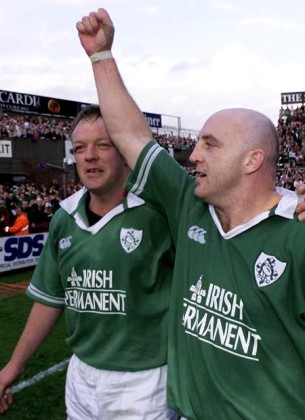 2001: The ‘Foot and Mouth’ International – Ireland 20 England 14
2001: The ‘Foot and Mouth’ International – Ireland 20 England 14
England under Clive Woodward should have completed a Grand Slam long before 2003. In 1999 they blew it at Wembley in the last game when Scott Gibbs skipped over for a late try and the following year Scotland avoided the wooden spoon by depriving them on the final day with a stunning victory in the sleet at Murrayfield
By 2001 England had steam coming out of their ears and they set about savaging the opposition with a series of irresistible performances scoring 28 tries as they battered Wales (44-15), Italy (80-23), Scotland (43-3) and France
(48-19). Ireland away should have been their crowning glory but by March 2001 the foot-and-mouth epidemic had taken hold of mainland Britain and parts of Ireland and there could be no question of a mass migration of England fans to a country which relies so heavily on its farming industry. Ultimately the game was postponed until October 20 and by then it was all change as Ireland skipper Keith Wood recalls.
“England had been on fire and playing incredible rugby but Ireland were in decent enough shape as well and we had good wins over Italy and France under our belts when the foot-and-mouth struck. Because of the travel restrictions it hit Ireland harder than anybody, we had to postpone our last three games while England’s visit to Dublin was the only match they had to rejig for the autumn.
“Momentum is a funny thing in sport. Come October and England were no longer on that magic carpet of form. Ireland had already played two tough Tests in the lead in. We lost badly – very badly – in Scotland in September but bounced back three weeks later with a fantastic win in Cardiff. We had blown our Grand Slam chances in Scotland but learnt our lessons well and then, just a week after the Cardiff win, we were at home to ‘all conquering’ England. It was nigh on perfect preparation from our point of view.
“England, meanwhile, had no warm-up games, a huge number of their players were tired after the Lions tour to Australia and now they had to visit Dublin to finish the job off. We fancied our chances from the off if I’m honest. It was a really awkward and difficult game for England and we knew that. And of course Johnno (Martin Johnson) wasn’t playing because he’d broken his hand and that was another factor in our favour.
“Scoring the Ireland try was just about the best moment of my Ireland career and overall we were good value for the win but I’m very aware that if Peter Stringer had not pulled off that last-ditch ankle tap on Dan Luger it might have been different. I have absolutely no idea how he did that. You watch again now and he has no right to make that tackle.
“It was madness over in the Berkley Court, the team hotel, afterwards with everybody wanting a part of you but I will always remember a very good friend of mine tapped me on the shoulder at one stage and said he had somebody very important I needed to meet and he dragged me away.
“In fact there was nobody there but he led me to a quiet corner where there was a table, two chairs and a very fine bottle of red open alongside two glasses. ‘Just take five minutes to savour the moment Keith, you don’t often get to score the winning try and captain Ireland to a win over England at Lansdowne Road’. And for five minutes I did exactly that, just pondering a great day. It was the only time I ever won against England and the last time I played against them. And then we supped up and re-joined the party!
2007 England crushed by the weight of history – Ireland 43 England 13
Ireland, ranked No.3 in the world, were kicking themselves at making a mess of a genuine shot at a Grand Slam by falling to a sloppy 20-17 home defeat against France in the first rugby game at Croke Park two weeks earlier. They had decided not to risk Brian O’Driscoll who had a hamstring strain against the French which was a decision they quickly regretted, but given the massive historical significance of the match against England at the same venue, Ireland could not have been more motivated.
Croke Park and Bloody Sunday had a resonance for Irish sportsmen that very few in England understood and indeed England coach Brian Ashton invited Conor O’Shea into the England camp before the match to try and explain its significance and why this would be a very different game.
In all, 14 Irish citizens were killed by British forces at Croke Park on Sunday November 21 1920 – Bloody Sunday – and 80 badly wounded – and among the dead were Tipperary’s half-back and captain Michael “Mick” Hogan which is why one of the massive stands at the ground is named after him. Hill 16 – the massive terrace that holds up to 15,000 fans – is built on the rubble of Sackville Street (renamed O’Connell Street when the British moved out) after the uprising of Easter 1916 had left the city centre in a state of some disrepair. The rubble was carted out to Croke Park, piled high and grassed over.
Bloody Sunday took place soon after the death of hunger striker Terence McSwiney and execution of Kevin Barry, and the Irish Republican Army were looking for revenge. At dawn on the morning of the match, in an operation planned by Michael Collins, a hit squad – the 12 Apostles – staged a series of raids on British intelligence officers in Dublin who were collectively known as the Cairo Gang. An hour later 14 covert intelligence officers had been killed and six badly wounded.
The British Army, based at Collinswood, considered where the Apostles might be hiding and thoughts turned immediately to Croke Park where a crowd of between 15,000 and 20,000 people was expected for a fund-raising match between Tipperary and Dublin. Anybody not co-operating would be shot dead on the spot. It was a combined exercise between the Police (RIC) and the Army (Black and Tans), with the latter taking the lead. A spotter aircraft was dispatched over Croke Park where the game had started half-an-hour late, and three armoured vehicles circled the ground. However, contrary to Hollywood’s version in the film Michael Collins – Liam Neeson taking the starring role – a tank did not burst on to the field.
So history weighed heavily in 2007. “The build-up seemed to start as soon as we’d lost to France a couple of weeks earlier,” recalls Brian O’Driscoll. “We played everything down, just another match, but come the day it was a simple team talk, ‘guys there’s no way they can want this match as badly as us, there’s no way we’re coming off this pitch as losers’.
“There is a big respect for the England rugby team in Ireland and we all know the story of their visit in 1973 during The Troubles when the other teams dropped out, but this was a game we simply couldn’t lose. It was a physical old match but we played very well indeed, we channelled the emotions and to beat England by 30 points on such an occasion was pretty much the perfect rugby day.”
After God Save The Queen was received with perfect respect – there had been scare stories of demonstrations and booing – England captain Martin Corry with a great sense of diplomacy applauded the crowd which earned a loud cheer. But Irish hospitality ended there and then as Ireland ripped in for four tries and Ronan O’Gara kicked 21 points, Paddy Wallace scoring the other two with a conversion. None of the England players who did duty that day will be playing next week but assistant coach Andy Farrell, who was playing centre opposite O’Driscoll – won’t forget the lessons of the day in a hurry.
2011: Grand Slam party poopers again – Ireland 24 England 8
History will show that it possibly all started going wrong for Martin Johnson on March 19 2011, six months before England arrived in New Zealand for their ill-fated World Cup, with a defeat against Ireland at the Aviva Stadium that sent a shiver down your spine.
After some pretty average years following the 2003 World Cup England fans were expecting nothing less than a Grand Slam after wins in their four previous games and a glorious triumph over Australia which included that memorable length of the field Chris Ashton try.
To these eyes that England were a tired team though who had actually peaked more than a month earlier with excellent wins over Wales (26-19 in Cardiff) and Italy (59-13 at Twickenham). Home victories in quick succession over France and Scotland were much less impressive, particularly the latter when England looked laboured and short of ideas.
The nation demanded and expected a Grand Slam though and expectations were high. I remember running an interview with Ronan O’Gara at the time when he said England were vulnerable because in his experience Grand Slam winners tended to flop over the line with sheer exhaustion. Not least with Ireland in 2009 while the only real exception in Six Nations history were England in 2003.
O’Gara actually did little more than make an intelligent and rational argument as to why he thought the game might be closer than some imagined but his reward was a volley of abuse, much of it foul-mouthed, some of which can still be found out there in cyberland.
Ireland were looking to salvage their season after disappointing defeats to France and Wales and were also aware that they had failed to do the Aviva Stadium justice since moving there. The stadium needed Christening properly and the Irish hit England with the traditional blitzkrieg and England looked disappointingly unprepared for it.
Jonny Sexton banged over three penalties and Brian O’Driscoll crossed for what would have been the try of the season but a pass from Tommy Bowe was adjudged as forward before Bowe did cross the line for a legitimate try. Sexton added a fourth penalty after Ben Youngs took the ball into touch and threw it into the crowd and the game was effectively over at half-time with Ireland leading 17-3.
After the break the party really got under way with O’Driscoll breaking the Championship record with his 25th try in the tournament and all that was left for England was a consolation try by Steve Thompson. It had been a humbling afternoon and the England balloon had been well and truly picked. They still won the Championship, the only England team to achieve that since 2003 and that should have been a springboard for something much better but that defeat hung over them all summer.
Johnson’s immediate post-match comments have a haunting ring still: “They completely outplayed us and we had a horrible first half. We came to win and we fell well short. It was the kind of day when everybody made one mistake so that’s 15 mistakes. This is a scar and we’ll have to wear that scar.”
As subsequent events proved it was rather more than a scar, it was a gaping wound.


